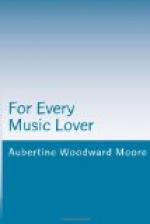Stephen A. Emory of Boston, whose studies in harmony are widely used, and who left behind him an influence as a teacher that is far-reaching, divined the true secret of musical education, from the rudiments upward, and expressed his views freely and clearly. He thought it indispensable for the musician to make music the central point of his efforts and equally indispensable for him to have, as supports to this, knowledge and theories from countless sources. “It must be as a noble river,” he said of the pursuit of music; “though small and unobserved in its source, winding at first alone its tortuous way through opposing obstacles, yet ever broadening and deepening, fed by countless streams on either hand till it rolls onward in a mighty sweep, at once a glory and a blessing to the earth.”
To conquer music a musician must have conquered self. As music can no more be absolutely conquered than self, the effort to gain the mastery over both necessitates a continual healthy, earnest striving, which makes the individual grow in strength, grace and happiness. That musician has been rightly trained whose every thought, mood and feeling, every muscle and fibre, have been brought under the subjection of his will. Professor Huxley uttered the following words that may well be applied to a musical education:
“That man, I think, has had a liberal education, who has been so trained in his youth that his body is the ready servant of his will and does with ease and pleasure all the work that, as a mechanism, it is capable of; whose intellect is a clear, cold, logic engine, with all its parts of equal strength and in smooth working order; ready, like the steam engine, to be turned to any kind of work, and spin the gossamers as well as forge the anchors of the mind; whose mind is stored with knowledge of the great and fundamental truths of nature and of the laws of her operations, one, who, no stunted ascetic, is full of life and fire, but whose passions are trained to come to feel, by a vigorous will, the servant of a tender conscience; who has learned to love all beauty, whether of nature, or of art, to hate all vileness, and to respect others as himself.”
The correctness of applying the last clause to the musician will be questioned by those who delight in enlarging on the petty jealousies of musicians. It will be learned in time that these foibles belong only to petty musicians, and that no one knows better how to respect others as himself than one who has enjoyed the privilege of the musical education that educates.
IV
How to Interpret Music
Certain learned college professors were once heard discussing methods of literary criticism and interpretation. They spoke of external and technical forms, and how magnificently these were illustrated in the world’s acknowledged masterpieces of literature. Every work read or studied, they decided, should be carefully weighed, measured and analyzed, and should be judged solely by the maxims and laws deduced from classical standards. The critical faculty must never be permitted to slumber or to sleep. Above all, the literary student should beware of trusting to impressions.




